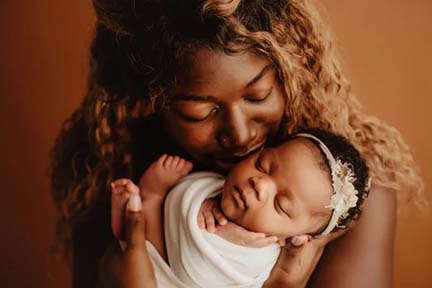
Michigan records lowest rate of infant mortality in its history
Press Release FOR IMMEDIATE RELEASE: June 18, 2025 CONTACT: Lynn Sutfin, 517-241-2112, SutfinL1@michigan.gov Michigan records lowest rate of infant mortality in its history; LANSING, Mich. – As the state marks the lowest recorded infant mortality rate in its history, attendees of the 8th annual Maternal Infant Health Summit gathered today and Tuesday to share ideas on how to continue efforts to improve the health of Michigan moms and babies. The event, hosted by the Michigan Department of Health and Human Services (MDHHS), convened a multidisciplinary group of state and national partners. “We are proud of the improvements we are making and will continue to make when it comes to the health of moms and babies,” said Elizabeth Hertel, MDHHS director. “The dedication of Governor Whitmer and the legislature, quality work conducted by partners across the state and collaboration with Michigan families and communities are key to our current and future success.” Infant mortality is defined as the death of a live born infant prior to their first birthday; the top three causes are prematurity and low birth weight, congenital anomalies and accidents and adverse outcomes. In 2023, 607 infants under the age of one died and the state’s infant mortality rate declined to 6.1 infant deaths per 1,000 live births. While there is still work to be done, this is a decrease from 2022’s, 650 deaths and 6.3 deaths per 1,000 live births. Deaths among Black infants fell to 11.9 deaths per 1,000 live births in 2023, also a record low. This is a reduction from 2022’s 14.1 deaths per 1,000 births, however, this rate is still nearly three times the rate of white infant deaths. MDHHS continues to focus efforts on keeping moms and babies healthy through the Healthy Moms, Healthy Babies initiative that was launched in 2021 to improve health outcomes and reduce disparities. It includes the expansion of postpartum Medicaid coverage to one year after birth and programs designed to assist families through pregnancy, birth and beyond, such as doula services and the Centering Pregnancy model of care. Doula services associated with improved birth outcomes Doulas provide non-clinical physical, emotional and educational support services to pregnant individuals during prenatal, labor and delivery and postpartum periods. Doula services have been shown to positively impact social determinants of health, support birth equity and decrease existing health and racial disparities. During her fourth pregnancy, Mia Jones of Detroit found the support and guidance she was seeking with doula services from Black Mothers Breastfeeding Association (BMBFA). The experience was so positive, Jones became a Mommy Ambassador for BMBFA, sharing her story and supporting other mothers as they go through their pregnancies. “Every pregnancy and birth are special and different,” Jones said. “I knew a little bit about having doula services, but wasn’t able to find or utilize a doula during my three previous pregnancies. Black Mothers Breastfeeding Association and the doula they provided me became the village and support I was searching for. My maternal health and the health of my unborn child was a concern for me considering my age, race and fourth pregnancy. I was looking for support I hadn’t received in my previous pregnancies including having a birth plan and breastfeeding for the first time. It was also important to me to receive emotional support because I was a high-risk pregnancy. My doula provided me with everything I wanted and more. I don’t think I could have gotten through my pregnancy without the support of my doula. This experience allowed me to have a voice to inform, educate and advocate in my community for doula services. The presence of a doula during a woman’s pregnancy is not only powerful, but very essential to positive maternal health outcomes.” There are currently more than 700 doulas on the MDHHS Doula Registry; nearly 500 of which are Medicaid-enrolled providers. Robena Hill has served as a doula for seven years as part of BMBFA and is a member of the state’s Doula Advisory Council. Her work is rooted in love, advocacy and education, and she ensures the families she serves are informed about safe sleep practices and the realities of infant and maternal mortality. “I’ve walked alongside countless families during one of the most sacred and vulnerable times of their lives,” said Hill. “The loss of two babies to sudden infant death within my doula journey forever changed me. It deepened my commitment to ensuring every family I serve is equipped with the tools and knowledge they need to create safe sleeping environments and make informed decisions. Every mother I support in labor is a life I fiercely protect not only to help bring their baby into the world safely but to make sure they survive childbirth as well. Black women are three to four times more likely to die from pregnancy-related complications, and that’s unacceptable.” Active as a trainer and mentor, Hill says she is extremely proud to help guide new generations of doulas to help continue improving birth outcomes in the state. “We are building a stronger, more informed and more compassionate birth community, one that uplifts, protects and advocates for every mother and baby, especially those in the Black community,” Hill said. CenteringPregnancy offers an innovative approach to prenatal care CenteringPregnancy is a model of care that integrates routine prenatal care and extra education about health, pregnancy and parenting within a group setting. It brings together moms due at the same time for discussion and interactive activities designed to address health topics including nutrition, common discomforts, stress management, labor and delivery, breastfeeding and infant care. In Michigan, there are currently 35 CenteringPregnancy sites and three CenteringParenting sites. Grassroots efforts address local needs Michigan Perinatal Quality Collaboratives are a network of diverse partners working to improve outcomes for mothers and babies. Nine regional perinatal quality collaboratives bring together health care professionals, community partners, families, faith-based organizations, Great Start Collaboratives, home visiting agencies and others to address clinical care and environment, socioeconomic factors and health-related behaviors. In FY24, the collaboratives identified key areas to focus on within their respective regions and provided $5 million in grant funds to 141 community-based projects. These projects spanned across all four priority areas of the Advancing Healthy Births plan, supporting breastfeeding, access to doula services, infant safe sleep education, increased access to prenatal and postpartum care, behavioral and mental health support and community health workers. In FY25, the collaboratives are providing another $5 million for additional community-based projects. In addition, each region is focusing on improving cardiac care in pregnant and postpartum patients. Improving care at birthing hospitals The Michigan Alliance for Innovation on Maternal Health (MI AIM) equips hospitals with best practices, including protocols and staff education, that make birth safer, improve maternal health outcomes and save lives. Currently, 89% of the state’s birthing hospitals are participating in MI AIM, with more than 80% implementing both hypertension and hemorrhage patient safety bundles. In FY24, Michigan birthing hospitals were provided funding to apply to The Joint Commission’s Maternal Levels of Care (MLC) Verification Program, resulting in 53 of Michigan’s 75 birthing hospitals applying to the program. For more information about programs to improve the health and well-being of women, infants, families and communities, visit MDHHS’ Maternal & Infant Health webpage. |





